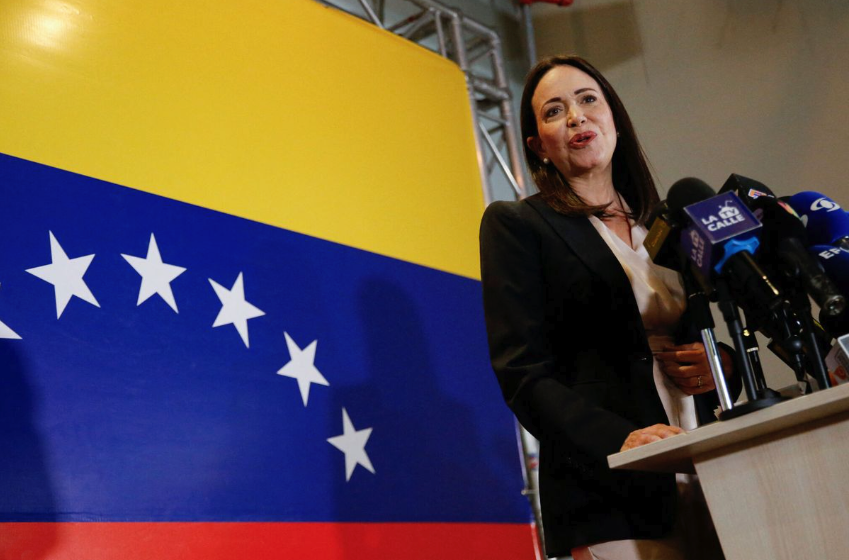María Corina Machado won resoundingly the primary election organized by the Unitary Platform parties in Venezuela. After the failure of the pressure strategy and collapse promoted by the parties of the extinct MUD, Acción Democrática, Primero Justicia, Un Nuevo Tiempo and Voluntad Popular sought to re-legitimize the leadership of the opposition in view of the 2024 presidential election by calling a primary election. However, the Unitary Platform was already broken. The problems associated with its lack of coordination, maintenance, and dissolution of the interim government led by Guaidó and the division resulting from the participation in the 2021 regional election, among other issues, prevented this mechanism from recomposing what was already fractured.
In this context, the primary election allowed María Corina Machado, and Vente Venezuela, to sneak into the primary, with modest numbers at the beginning but growing throughout the year passed between the announcement of the primary and its celebration. The paradoxical aspect of this process is the coexistence of two contradictory ideas in constant tension.
On the one hand, the idea is that using authoritarian institutionality, specifically elections, is not possible to achieve a democratic transition. Let us recall that María Corina Machado, and Vente, supported Guaidó’s self-proclamation as president of the interim government in January 2019. However, she was always critical of the interim for not being forceful enough in their requests or actions to seek a factual exit from the government, calling for increased sanctions, opposing any negotiation that did not entail the immediate exit of Maduro and even calling for a “humanitarian” military intervention.
In this way, Machado positioned herself as a moral reference against an interim government increasingly entangled with corruption cases and the inability to comply with the promised mantra: “cessation of usurpation, the transitional government, and free elections”. Thus, the failure of Guaidó, VP, and the interim took its toll on the entire opposition coalition, especially in its most militant bases in the urban areas of the declining middle class. And Machado managed to present herself as an outsider, despite the support initially given to this instance.
In this same way, Machado has also embraced a moral discourse, in which she frames the political contest as “an existential struggle, of good against evil”, in which there are no half measures or intermediaries between her and her followers. And so forth, her leadership style is reminiscent of Nayib Bukele’s populism in El Salvador.
On the other hand, the primary that was called to choose the candidacy for the presidency of the Republic in 2024 is the recognition that political change is possible through the use of institutionalized mechanisms for the search for power in Venezuela. But it is also a recognition of the Unitary Platform as a space to solve the collective action problems involved in selecting a candidate for the presidency. Machado could easily have chosen to present her candidacy without going through this process, but she understood that in order to aspire to replace this instance she had to use its mechanisms and beat them on their own ground.
In this way, Machado understood that she had to compete with the rules of those who had tried to monopolize the opposition representation in Venezuela and did not fall into the miscalculations of the Alianza Democrática, LAPIZ or Fuerza Vecinal parties, which sought to be the new referent of the opposition because “worse is nothing” or because they were the only ones authorized by the government to participate.
Thus, her first mission was to conquer the space of representation of the traditional opposition with her own rules, and she succeeded with flying colors. However, this is not enough to threaten the power of the authoritarian government. In contrast to the organizational context within the opposition, the rules of the national electoral arena are much shakier, in addition to the advantages and repression by the state. To undertake this challenge, Machado will need to go beyond the niche she built on the right of the G4, and start weaving alliances with broader social, political, and economic sectors, which in the past her close collaborators and supporters have labeled as “collaborationists”, “traitors” or “scorpions”, not only among political parties but also with civil society organizations and people who promoted electoral participation in 2018, 2020 and 2021.
Additionally, Machado will also have to overcome the barriers of ideology and interests of her party. In a country whose degree of destruction has left many citizens in a state of helplessness, the support of the state will be needed so that the most vulnerable can get ahead while the country recovers. Ignoring this reality will make it more difficult to convince those who today do not identify with either the government or the opposition, as they will see in its rise a threat to their livelihood.
It should be noted that some positive signs seem to have been shown in the weeks before the primary. On the one hand, the alliance with Freddy Superlano, who represented the Voluntad Popular (VP) that supported participation in the 2021 regional, implied a tacit acceptance of the importance of having participated in that event. However, this alliance also brings the fear “La Salida” redo of 2014. On the other hand, the signing of the Barbados agreements, the moderation toward the agreement, and the recognition of Gerardo Blyde as head of the delegation are also positive signs in this direction. Likewise, the reception of the main candidates during the night of the primary was a sign of openness. However, it will be necessary to wait if these signals will be converted into concrete actions that will translate into the construction of a broader front, as promoted by Andres Caleca throughout his campaign, since without coordination there will be no paradise.
Finally, the factual disqualification of María Corina Machado by the government is the most important challenge facing the 2024 presidential election. The question is whether her slogan in the primary, “Until the end”, will be about her candidacy or about the democratic transition. In the first case, the scenario is a new inflexible mantra, where the only possible end is for her to be a candidate and, if not, boycott the election. In case she can register, there is a real possibility of her winning the election over Maduro and initiating a process of political change. If not, there is a real risk that the scenarios of 2013 and 2017, in which street protests will bring down the work of political-electoral construction and organization, will be repeated.
Now, if, on the contrary, the “until the end” is about a democratic transition, the issue is not the candidacy but winning the election in an authoritarian context. This does not mean giving up the candidacy beforehand, but then generating all the possible pressure to be able to run and, if she is unable to do so, to position herself as the great voter of the substitute, through the construction of a consensual mechanism for the replacement of her candidacy. That is to say, if the ultimate goal is to defeat the government in the electoral arena as part of a broader strategy to promote a possible transition, then, the “until the end” has no name, even if she leads it.
Thus, the victory of María Corina Machado has generated hope in some opposition sectors that were disaffected with the MUD parties. Although this is a good start, it is not enough. Greater openness, inclusion, and coordination are needed not only on her part but also for her entourage and followers; otherwise, the risk of fragmentation or disinterest will make it even more difficult to build the democratizing alliance necessary to achieve the democratic transition of the country. That said, the result also assumes that, on the other side, both the parties and candidates who participated in the primary and those who remained on the sidelines recognize the new role of Maria Corina Machado within the opposition. Therefore, she cannot be ignored in the future decision-making process. Meanwhile, the government, despite having signed the Barbados agreements, will continue to exercise its authoritarian practices as seen after the October 22nd primary.
*Translated by Janaína Ruviaro da Silva from the original in Spanish.











